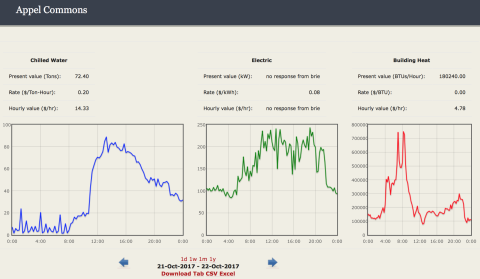Energy Metering
The energy metering program provides the standards for metering, assists with the installation of new and temporary metering, and maintains a fleet of meters that track the usage of electricity, steam, chilled water, and water for all Cornell buildings connected to central campus utilities. Meter data is the basis for the billing of campus utility usage, and data is stored for over 1000 campus meters. We also assist customers with the connection of loads to our local public utility providers.
Background
Cornell University produces and distributes steam, electricity, chilled water, and potable water. Natural gas, sewer processing services and some potable water and electricity are purchased from municipalities and other vendors and distributed over campus networks. The costs of production, procurement, and maintenance are recovered from university departments and administrative units based on the usage of each utility. The Utilities Data System (UDS) allows the staff of the Finance Office to oversee the utilities operations for the University and to provide utility data. This data can be viewed at the computer terminal (online) or via a number of reports. The system has two main functions:
- Track and report on utility usage on a meter-by-meter basis (meters are also called monitoring points), and
- Invoice departments and administrative units for that usage.
The metering system is an integral part of UDS. The meters and database work in concert and one does not function without the other. The meters provide the consumption information and the data system (a software system called "EBS" by Instep) collects and stores the consumption information. The metering system/program functions to meter all utilities necessary for the tracking and custody transfer of campus energy. Utilities metered include: Electricity, Steam (condensate), Hot Water (heating), Chilled Water, Potable Water (also used for sewer), and Natural Gas. Meters are all “revenue grade” i.e. they are not HVAC grade units. Meters are specified in the Cornell Design and Construction Standards. Where possible, the meters are connected to the Campus EMCS System as part of the monthly UDS cycle, specific utilities are checked as families, and circuit reports are run to check Sales-to-Production percentages, metering anomalies are flagged, and all suspect units are checked and either verified or repaired between cycles.
The electric system has a circuit report. Circuits are verified from the building level up through hierarchical circuits to the main production meters. Meters can be verified either by a parallel data logger installed on the service and a revenue grade replacement meter is installed in its place if needed.
The Steam/Condensate Metering System is verified monthly by a sales to production report. Anomalies are flagged (zero to very high consumption). Suspect units are checked via their consumption history and weather corrected forecasts. Further checks can be made with the calibration port installed on each metering/monitoring point as specified in the Cornell Design and Construction Standards. Units are standardized by two manufacturers to facilitate competition, as well as to be kept simple enough for document record keeping.
Chilled Water Metering is verified based on the use of a sales to production report. Anomalies are flagged (zero to very high consumption). Suspect units are checked via their consumption history and weather corrected forecasts. Meters are also checked by downloading meter information to an Excel spreadsheet for an initial check for suspect data.
Potable water meters are run through a sales to production report as well as a percent change report looking for unusually high or zero consumption services. The potable water meter utility units are checked annually for meters older than 25 years. The oldest units are replaced. Suspect meters are removed and flow checked for accuracy at the FORD calibration test stand located in the Pipe Shop Annex. Meters are either re-certified or summarily replaced.
Sewer is billed based on potable water consumption. We do not use effluent meters.
Natural gas meters are checked by NYSEG as needed.
Thermal Meters (Hot Water Systems) are checked by a variety of reports: BTU/ft^2, Consumption, % change, and Year-over-Year comparison, as well as family hierarchy where applicable. Most units are connected to the campus EMCS system and can be downloaded by 4-hour data sets for analysis of suspect data. High-quality, reliable standardized components are used to minimize break-downs, and to facilitate quick and efficient repairs when needed.
Resources:
Real-Time Building Use Utility Data (exits to EMCS dashboard)
The EMCS portal provides access to real-time energy consumption for campus buildings, electric generation from our solar photovoltaic electric systems, central energy plant electric generation, and weather data.
The Big Red Energy Scoreboard
The Big Red Energy Scoreboard (formerly Building Dashboard) provides contextualized real-time utility data in a transparent effort to reduce the campus’ energy consumption and carbon footprint. It also provides information about campus sustainability initiatives, energy conservation tips, and an interactive discussion board.
Building Utility Use and Costs History
Individually metering and displaying each building's resource use is instrumental to a sustainable campus. You can personally monitor your building's consumption and visualize the benefits of your efforts. The uses for the site are endless: inter-residence hall competitions such as the Campus Sustainability Office’s Energy Smackdown, establishing a "Green Fund" system where utility savings are returned to department budgets, tracking the effects of energy conservation initiatives, and identifying high-resource-use buildings, just to name a few.
Cornell University individually meters each facility's electricity, steam, natural gas, chilled water, potable water, and sewer use. This information is available to the Cornell community, with data provided by the Utilities Billing System. Please contact us through the email below if you need more information on your department's monthly billing.
Campus Building Utilities
For more information regarding meter reporting and billing please contact:
Energy and Sustainability Department
energy-sustainability@cornell.edu

